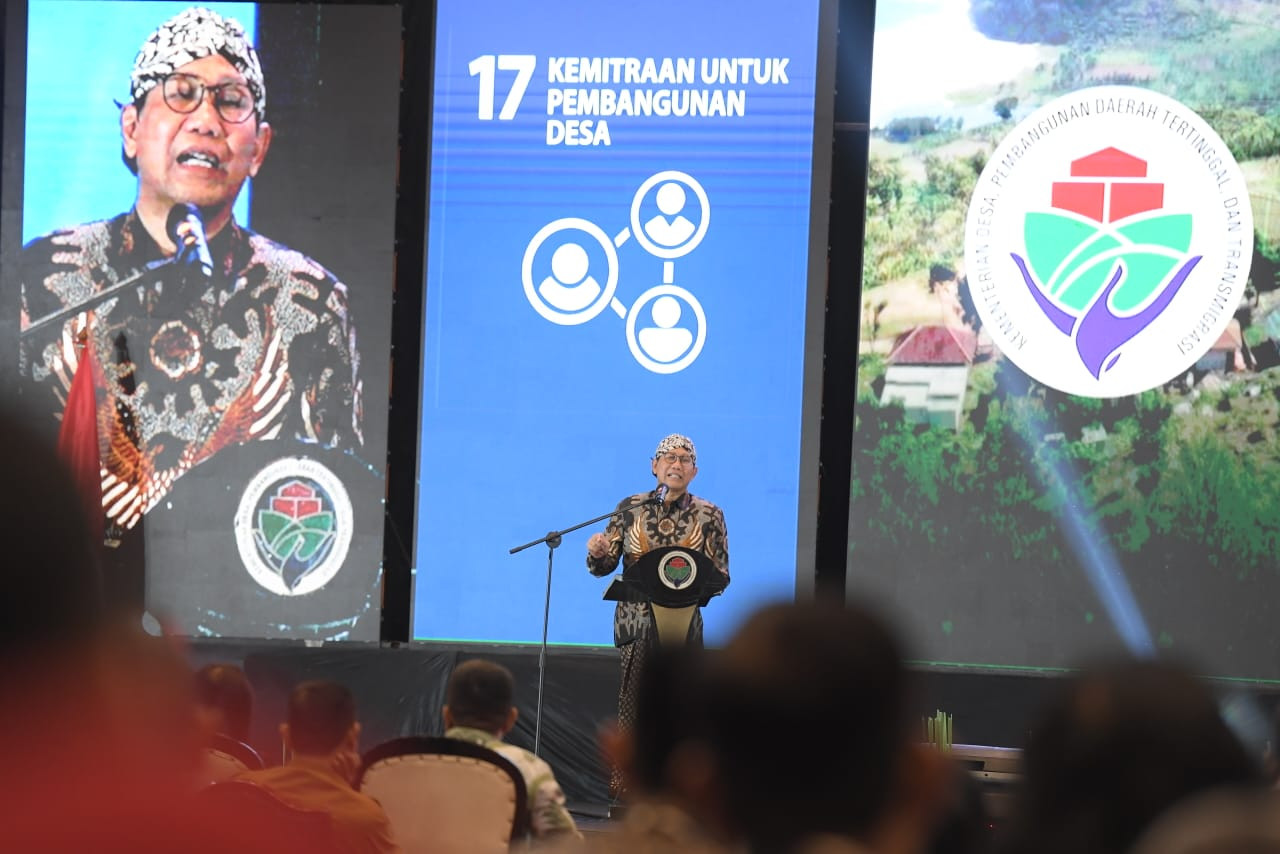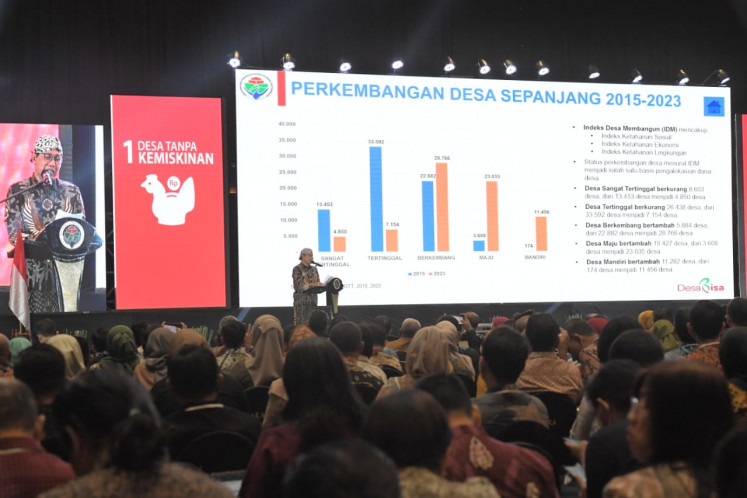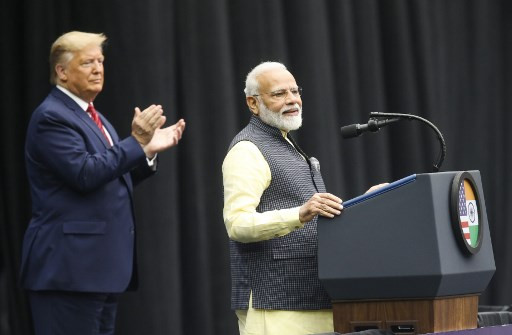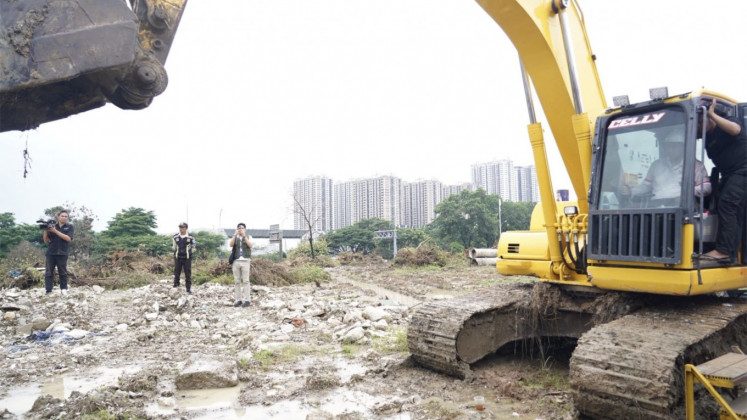Popular Reads
Top Results
Can't find what you're looking for?
View all search resultsPopular Reads
Top Results
Can't find what you're looking for?
View all search resultsRegional governments contribute 41 percent to village development: Minister
To ensure consistent results, collaboration between the central government and regional governments must share a common agenda that focuses on responding to similar field challenges, as well as a similar policy direction and objectives.
Change text size
Gift Premium Articles
to Anyone
 The Policy Synergy and Implementation of Development and Empowerment of Communities, Villages, Disadvantaged Regions and Transmigration between the Central Government and Regional Governments Forum was attended by 1,300 community heads and village empowerment workers, heads of Development Planning Boards (Bappeda) and heads of provincial, district and city transmigration services.
The Policy Synergy and Implementation of Development and Empowerment of Communities, Villages, Disadvantaged Regions and Transmigration between the Central Government and Regional Governments Forum was attended by 1,300 community heads and village empowerment workers, heads of Development Planning Boards (Bappeda) and heads of provincial, district and city transmigration services.
T
o ensure consistent results, collaboration between the central government and regional governments must share a common agenda that focuses on responding to similar field challenges, as well as a similar policy direction and objectives. Only in this sphere of shared goals can collaboration succeed.
Villages, Disadvantaged Regions and Transmigration Minister Abdul Halim Iskandar reiterated the importance of synergy at the Policy Synergy and Implementation of Development and Empowerment of Communities, Villages, Disadvantaged Regions and Transmigration between the Central Government and Regional Governments Forum.
The forum, held in Bidakara, Jakarta on Oct. 10, was attended by 1,300 community heads and village empowerment services, heads of Development Planning Boards (Bappeda) and heads of provincial, district and city transmigration services.
In 2023, the total budget for villages (APB Desa) reached Rp 124 trillion (US$7.88 billion). Regency and city governments contributed Rp 47 trillion to this, contributing 38 percent to village development. Meanwhile, provincial governments contributed Rp 4 trillion, a 3 percent contribution to village development.
In total, provincial, district, city and regional governments contributed 41 percent to the village development budget.
"Therefore, we can observe the important role of the central government and regional governments in village development, from the budgeting and implementation stages to the evaluation stage," Halim said.
"The results, benefits and impacts of village development will definitely be higher when the central government and regional governments increasingly strengthen the synergy of policies and their implementation."
At the global level, the synergy is aimed at meeting the sustainable development goal (SDG) targets by 2030, which have been translated into the National Development Goals for 2030, as well as the Golden Indonesia 2045 vision.
According to Halim, synergy between the central government and regional governments in managing the development of villages, disadvantaged areas and transmigration must be directed according to the Master Plan for the Development of Villages, Disadvantaged Regions and Transmigration.
Furthermore, he explained that the development trajectory includes two systematic stages: from 2023 to 2030, achieving the Village SDGs targets; then, from 2031 to 2045, strengthening the position of villages in the Golden Indonesia 2045 vision.
Apart from agreeing on annual, medium-term and long-term development planning documents, synergy is starting to be established on a daily basis through intensive communication between ministries and institutions at the central level, Bappeda, the Community and Village Empowerment Agency and the Transmigration Agency at the provincial, city and district levels.
Halim has called for the Whatsapp groups containing the heads of Bappeda, Community and Village Empowerment Agencies and Transmigration Agencies to be active so that they can communicate and convey benefits to the communities they serve.
In addition, he also stated that the national Synergy Forum next year must be filled with regional government innovations in making villages independent, advancing village-owned enterprises, accelerating the development of underdeveloped areas and increasing the competitiveness of transmigration areas.
Halim further elaborated that Golden Indonesia targets 0 percent very underdeveloped and underdeveloped villages, 100 percent developed and independent villages, 100 percent village-owned enterprises in the advanced category, zero underdeveloped areas and 100 percent competitive transmigration areas.
This article was published in collaboration with Ministry of Village, Development of Disadvantaged Regions and Transmigration










